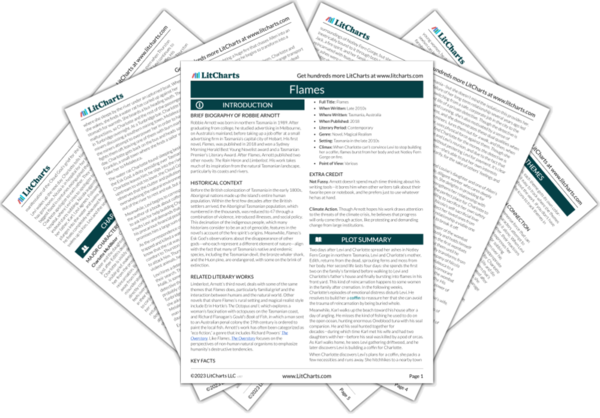Many of Flames’s female characters find themselves underestimated, threatened, or controlled by men. Though these men’s sexist behavior is often unconscious, it nevertheless affects their decision-making abilities, which in turn puts the women around them in danger. For instance, when Charlotte and Nicola ask the ranger for help leaving the farm they work at, an environment they feel has become unsafe due to their manager Allen’s increasingly erratic behavior, he doesn’t call for a plane to take them away until he visits the farm to confirm their report. Though the sexism in the ranger’s decision is subtle, it shows that he trusts Allen’s more senior, male presence on the farm more than the word of two young women. Ultimately, not only does his ingrained prejudice put the two women in harm’s way, it also plays a key part in kindling the feelings of frustration, fear, and rage that set off Charlotte’s fire, which causes Allen severe burns—a sign that sexism is harmful not just for women but for everyone.
The novel explores sexism in a more blatant and violent way when depicting the miners’ behavior when they encounter both Charlotte and the detective. In both instances, the miners’ assumption that they can control these women drive their actions. They have no interest in being on equal terms with the women they’re interested in, preferring to overpower them physically. Yet, when these women use their own physical power to defend themselves, the miners resort to anger and misogynistic language, which demonstrates that women are only desirable to them if they do what they want without resistance. In both its subtle and blatant portrayals of sexism, the novel criticizes the careless assumptions men make about women and demonstrates that these assumptions can cloud the reality of a situation, creating danger for all involved.
Sexism ThemeTracker

Sexism Quotes in Flames
I could’ve gone over, shown them my photo of the McAllister girl and tried to sweet-talk the information out of them, but my gut told me they wouldn’t give me anything. The boorish looks on their faces told me something else. I didn’t like it, but I knew I could handle it.

Unlock explanations and citation info for this and every other Flames quote.
Plus so much more...
Get LitCharts A+They simper after the herd, cooing and frowning at the skinny beasts, treating them as if they were sick children, not mindless marsupials. They are certainly no help in dealing with what is actually threatening them. Each morning I march off, gun in hand and knife in belt, as their eyes follow me filled with what looks more and more like fear. It is futile, feminine softness, and nothing more. I am beginning to regret hiring them.
But as far as he knew, Allen was fine. A quiet man, but a sane one. A good farmer. A friend, or the closest thing to a friend he had down here. So he didn’t give these women what they wanted, not straight away. He told them he’d visit the farm. He would see it all for himself, and he would sort things out.











